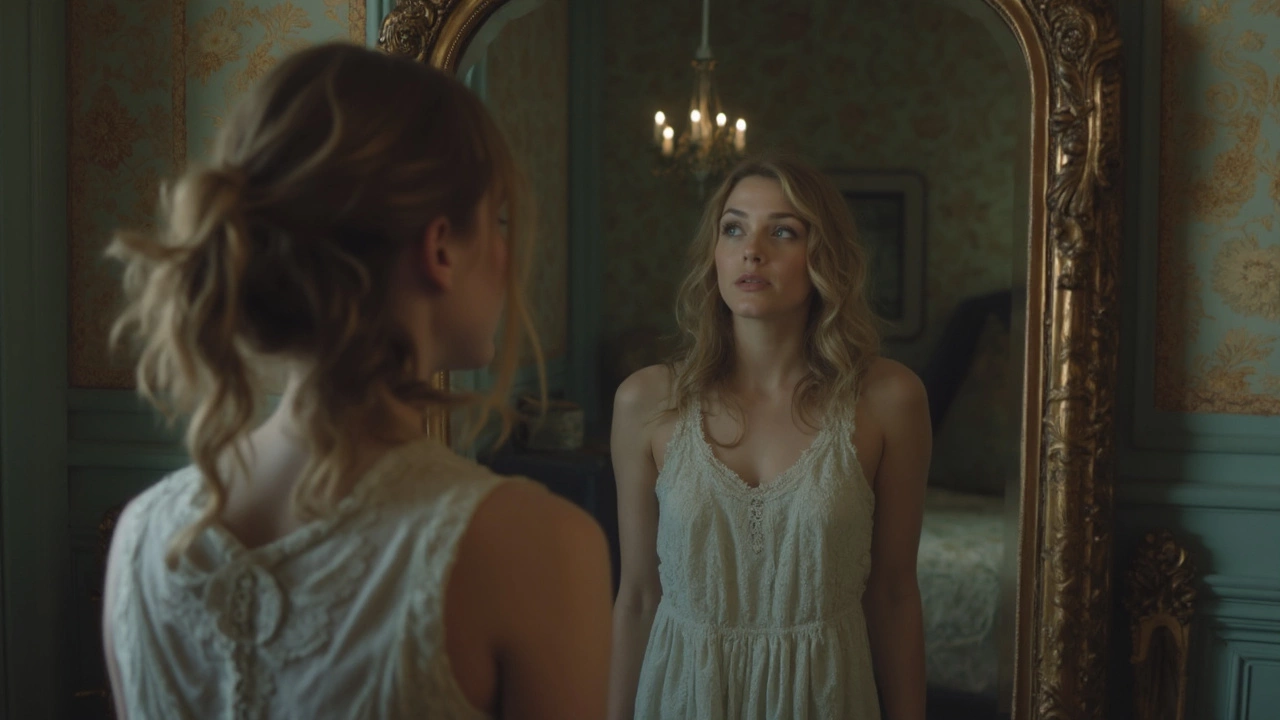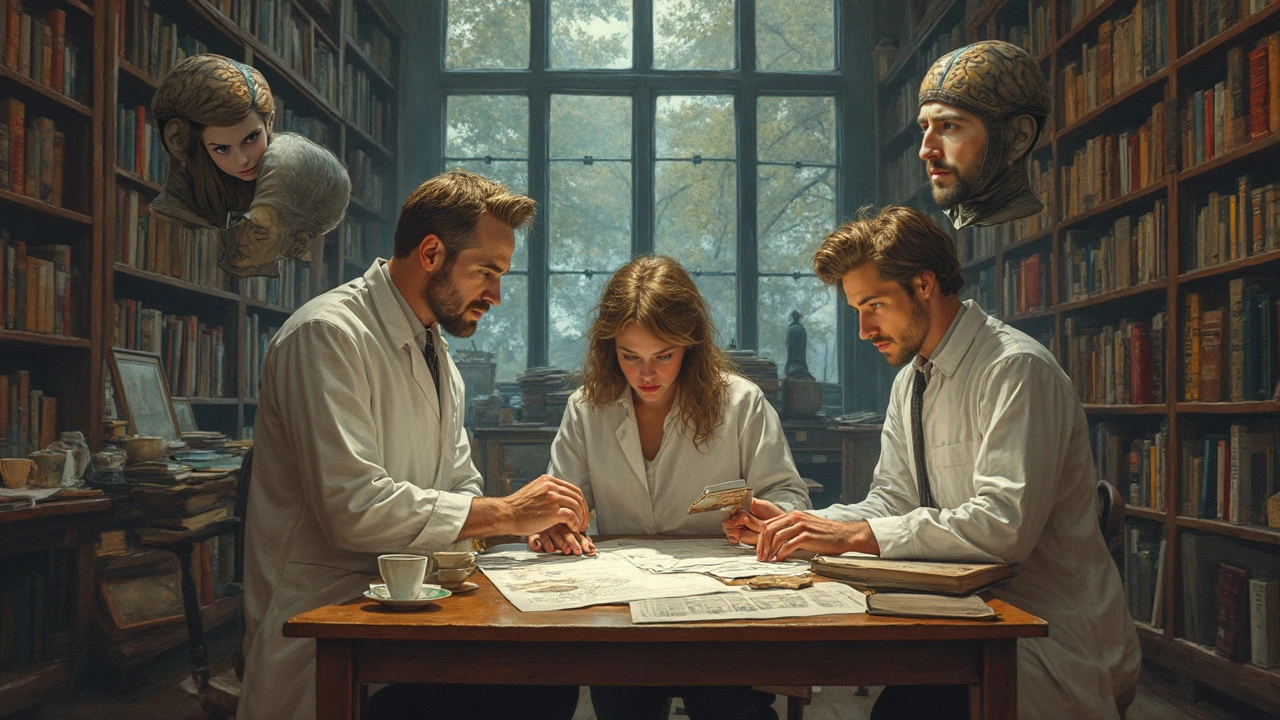Why You Shouldn't Stare at a Mirror: The Science and Psychology Behind Mirror Gazing
 Jun, 27 2025
Jun, 27 2025
Standing in front of the mirror, time can easily slip away. No one tells you how strange things get after you’ve stared a little too long—like your own face morphing into something unrecognizable, or that weird feeling that you’re no longer alone with your reflection. It’s eerie, sure, but there’s a lot more at play than superstition or folklore. Science and psychology actually have quite a bit to say about why locking eyes with your own image for too long can mess with your head, steal your productivity, and even nudge your self-esteem off a cliff. You might think it’s harmless, but staring at a mirror for minutes on end can quietly stir up trouble for both your mind and body.
The Psychological Maze of Mirror Gazing
Most of us are drawn to mirrors because we want feedback on our appearance, like double-checking if there’s spinach in our teeth or taming that wild cowlick. But here’s the weird part: the longer you lock eyes with your own reflection, the more your brain starts to play tricks. In 2010, Italian psychologist Giovanni Caputo ran a study that asked participants to stare at their own faces for ten minutes in low lighting. Nearly every one of them reported their faces had started warping, changing, or—get this—transforming into animals, strangers, or even monsters. It’s called the “strange-face illusion,” and it’s your brain’s way of dealing with too much, too long visual feedback of yourself.
So why does this happen? Your visual system gets overloaded. When your brain gets too much of the same information over a sustained period, it starts to misfire a little, filling in the gaps with unexpected imagery. You’re basically hallucinating, all thanks to your mirror and your mind’s hunger for novelty.
This isn’t just a random party trick for Halloween. There’s a psychological flip side. The more we analyze our own faces, the more likely we are to pick ourselves apart. Zoom in close enough, and everyone finds flaws—bigger noses, uneven brows, skin that isn’t flaw-free. That’s fine for a quick fix, but long sessions in front of the mirror can nudge existing insecurities into major preoccupations. The phenomenon’s even been linked to a condition called body dysmorphic disorder (BDD). People with BDD stare, scan, and study their features to the point of obsession, seeing imperfections that no one else notices. Even those without BDD can find themselves shaken after a marathon mirror session, walking away feeling less confident instead of more. The connection is real—a 2022 survey published in the journal "Body Image" found that frequent mirror gazing is strongly linked to increased body dissatisfaction, especially among teens and young adults.
And it’s not just about appearance. There’s a strange existential layer tucked into long mirror stares. The psychologist Jacques Lacan even argued that mirrors mess with our sense of self. If you’ve ever felt weird or “unreal” while staring at your reflection, that’s your brain having a mini identity crisis. Your sense of “me” can get so mixed up that for a few seconds, you don’t even recognize your own face. This can feel kind of creepy, but it’s a real effect that’s been documented. Staring too long not only chips away at self-esteem but can also invite a brief, unsettling feeling called depersonalization—like watching yourself in a movie rather than through your own eyes.
Plus, our kids are watching. When I catch my son Dorian or my daughter Selena planting themselves in front of the bathroom mirror for ten minutes at a time, I have to remind them that mirrors aren’t magic portals—they’re just glass. Spending too much time analyzing and re-analyzing every detail teaches them the wrong lesson about perfection and self-worth. In fact, studies say kids who focus on their looks in mirrors a lot are more likely to compare themselves to others and feel down about things that don’t really matter.

Eye Health and the Physical Toll of Prolonged Mirror Staring
We rarely stop to think about the physical things happening when we stare at ourselves for too long, but our eyes feel it, and our brains work harder than we realize. Staring at a mirror isn’t much different from staring at a screen—except there’s a double dose of feedback, since you’re not just observing an object, but evaluating yourself through it. Your eyes work overtime to keep focus steady, especially if you’re making expressions or trying to get a good close-up view.
The problem with intense, unblinking focus is that your blink rate drops. Normally, people blink around 15-20 times per minute, but when focusing intently—especially close up—this can fall to five times per minute or less. Fewer blinks means your eyes dry out faster, leading to irritation, redness, and even headaches. If you’ve ever stepped away from a mirror feeling a bit fuzzy or tired-eyed, that’s why.
The light around mirrors can mess things up, too. Most bathroom lights are harsh, and the contrast between your face and the background can tire your eyes. According to optometrists, repeated exposure to harsh lighting while focusing up close can make you more susceptible to digital eye strain—a problem usually reserved for long hours in front of a computer. To put numbers on it, the Vision Council reports that about 59% of American adults experience digital eye strain, and yes, the same symptoms can be triggered by mirror-staring marathons under strong lighting.
Even posture takes a hit. Leaning over a sink, craning your neck for the “right angle,” and squinting all create tension. A survey by the American Chiropractic Association found that 41% of respondents reported neck or back pain tied to their morning routines, which often included time fixated on their mirror image. Over time, these repetitive bad habits add up, causing soreness that can follow you through the day.
Is this risk enough to skip mirrors altogether? Not at all—healthy use is fine, but the key is moderation. Just like you wouldn’t want your kids glued to their tablets all day, you don’t want them (or yourself) locked in a trance with the mirror either. Here’s a useful idea: keep mirrors in common areas, not bedrooms. This keeps usage functional—checking for toothpaste, tidying up hair, and getting on with real life, instead of zoning out in a private, critical echo chamber.
Symptoms of mirror-related eye strain are real, and can include:
- Dry, irritated eyes
- Eye fatigue
- Headaches
- Blurry vision after looking away
- Neck or shoulder pain from poor posture
If these sound familiar, you probably need to break up those mirror sessions. A good rule? The 20-20-20 approach—every 20 minutes, look away at something 20 feet away for at least 20 seconds. It’s not just for screens; it fits any intense visual focus, including checking yourself out in the glass.
Here’s some comparison data of common activities that can tire out your eyes:
| Activity | Blink Rate (per minute) | Reported Eye Strain (%) |
|---|---|---|
| Normal conversation | 15-20 | 12% |
| Reading a book | 10-12 | 28% |
| Mirror gazing (high focus) | 4-7 | 36% |
| Screen time (computer/phone) | 4-8 | 59% |
This table shows that *mirror gazing* is harder on the eyes than reading, and almost as bad as the dreaded screen time everyone’s always talking about.

Building Healthy Mirror Habits and Breaking the Stare
Alright, so mirrors aren’t out to get you, but a little self-awareness goes a long way toward keeping your relationship with your reflection healthy. Step one is just noticing how much time you spend in front of the glass. If you’re like most people, you’re probably underestimating it. Try leaving your phone timer on or making a mental note tomorrow morning. You might be surprised how long that makeup or beard-trimming routine really takes up.
Swapping mindless staring for mindful moments is a solid move. Instead of zoning out and losing track of time, set a purpose for why you’re in front of that mirror and stick with it. Here are a few tips that actually work for cutting down and feeling better about it:
- Limit mirror sessions to only what's needed. Fix your hair, brush your teeth, and get out—don't linger.
- Use a small, portable mirror for close-ups. Less surface area means less temptation to scrutinize every blotch or freckle.
- Cover or move mirrors in rooms where you’re prone to excessive gazing, especially bedrooms. This is great for kids and teens.
- Switch the focus. Instead of asking, "How do I look?", try, "How do I feel today?" It’s cheesy, but it works over time.
- Try affirmations or gratitude exercises away from the mirror. Start your day by writing down something you like about yourself that doesn't involve your appearance.
- If you catch yourself zoning out, shake it off—literally. Move, stretch, or step out of the room to reset your focus.
- Notice when mirror time triggers negative self-talk, then redirect your thoughts or do something hands-on like making a coffee or stepping outside.
- Encourage similar habits with your kids. Be a role model—talk about strengths that have nothing to do with looks and get them feeling good from the inside out.
If you or someone in your family feels anxious, obsessed, or downright miserable after looking in the mirror—don’t brush it off. Sometimes, talking with a therapist or counselor is the best next step. Early help can prevent appearance-focused habits from snowballing into bigger issues. Therapists see this all the time, and early feedback shows that just two or three counseling sessions can break unhealthy patterns before they take root.
Finally, remember that your mirror isn’t the boss of you. You can choose how much power it has over your day. Checking your look is totally normal, but letting it define your mood, confidence, or sense of self steals time and energy from the things—and people—that actually matter. And in a world obsessed with selfies, filters, and endless scrolling, it’s easy to believe that how you look in the mirror is the most important thing. It isn’t. Life’s too short to spend it chasing after perfection on a piece of glass.